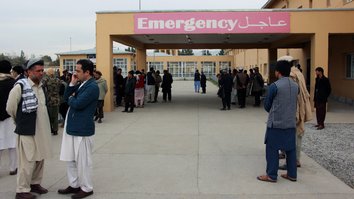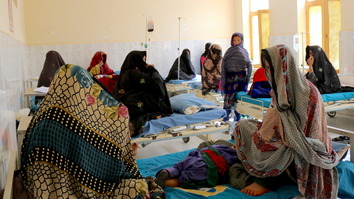HELMAND -- The United Nations Children's Fund (UNICEF) and the World Health Organisation (WHO) have established 53 health centres in Lashkargah city and a number of remote districts of Helmand province.
The health centres, which were built over the past year, were established in remote areas where residents previously did not have access to health services.
They are equipped and staffed to provide standard and specialised health services, said Helmand Public Health director Dr. Sayed Ahmad Sayedi.
"In addition to Lashkargah city, these health centres have been established in Nad-e-Ali, Gereshk, Sangin, Musa Qala, Kajaki, Nawa, Marjah and Nahr-e-Saraj districts," he said.
![Patients and their family members wait outside a local clinic funded by the United Nations Children's Fund (UNICEF) and the World Health Organisation (WHO) in Sangin district, Helmand province, on February 23. [Abdul Khaleq Hamim/Salaam Times]](/cnmi_st/images/2023/03/01/40981-h_32-585_329.jpg)
Patients and their family members wait outside a local clinic funded by the United Nations Children's Fund (UNICEF) and the World Health Organisation (WHO) in Sangin district, Helmand province, on February 23. [Abdul Khaleq Hamim/Salaam Times]
![This photo, taken on July 22, shows children walking outside the Musa Qala District Hospital in Musa Qala, Helmand province. UNICEF and WHO have opened 53 clinics in remote areas of the province to reach underserved communities. [Lillian Suwanrumpha/AFP]](/cnmi_st/images/2023/03/01/40985-32fg8uq-highres-585_329.jpg)
This photo, taken on July 22, shows children walking outside the Musa Qala District Hospital in Musa Qala, Helmand province. UNICEF and WHO have opened 53 clinics in remote areas of the province to reach underserved communities. [Lillian Suwanrumpha/AFP]
"Prior to this, [residents] did not have access to health services and used to go through so much to bring patients to the provincial hospital in Lashkargah city."
"Specialist physicians, nurses and midwives are present in each health centre," he said, adding that most of the medics are women.
Around-the-clock health care
Sher Mohammad, 46, a resident of Musa Qala district, recently brought his malnourished one-month-old baby to the health centre in his area for treatment.
"Two days ago my son was admitted to the clinic, and the doctors are taking good care of him," he said on February 23. "They give my son free medicine and food, which have improved his condition."
"In the past, when there was no clinic, we had to take our patients to the district centre or to Lashkargah city," Sher Mohammad said.
"In case of an emergency ... at night, we used to face so much trouble to transport them to the hospital," he said. "But now, with the establishment of the clinic, we have access to health services around the clock, near my house."
"The availability of female doctors in the clinic has greatly improved health services for women and children," he added.
"Most importantly, the gynaecology section in the clinic has helped save the lives of mothers and infants. Before this, mothers and infants would lose their lives because they couldn't reach a clinic on time."
Sahib Khan, 48, a resident of Sangin district, brought his four-year-old son on February 25 to the newly established clinic in his community, run by UNICEF, for treatment.
His son was suffering from a stomachache. After two days of treatment, his health condition improved.
The establishment of the clinic in his area has made life more convenient, Sahib Khan said.
"In the past, when there was no clinic in our area, we had to transport our patients to the hospital in Lashkargah city ... It was very insecure and far away, and it took us hours to reach there, but now we have no problems in this area."
"Very skilled doctors have come to the clinic and provide good services to the patients," he said. "There were no female doctors in our area before, but now female doctors provide health services to the women of our area."
Abdul Hanan, 56, a resident of Sangin district, also expressed relief at having a health centre in his area that is open 24-hours a day.
"The availability of female doctors in the clinic in our area has made it very convenient for residents of our community," he said. "Now, women and children can go to the clinic on their own and receive treatment."
"We used to take patients to clinics in the district centre or in the city in the past, which was very difficult. But now, even at night, we very conveniently take patients to the clinic near our houses," he said.
Saving lives
The male and female physicians who work in the clinics save the lives of patients living in remote areas deprived of services.
Dr. Dost Mohammad Paktin is a paediatrician working at one of the clinics in Musa Qala district.
"Diseases such as pneumonia ... are prevalent among children," he said. "But we also receive malnourished children on a daily basis."
"This area where the clinic is located is very remote and far away from the district centre," he added. "In the past, some of the children and infants suffering from pneumonia and other illnesses would lose their lives because they couldn't get to a clinic on time."
The mortality rate will decrease with the establishment of health centres in villages and remote areas, he predicted.
Paktin said his clinic has sufficient resources and that medications are available for all patients.
Dr. Hayatullah Ranjbar, an internal medicine specialist at a clinic in Sangin district, said his health centre provides services around the clock in a number of fields.
"In the gynaecology section, specialists and midwives are present and provide 24-hour services," he said. "Female vaccinators are also available in this health centre, vaccinating children on a daily basis."
"Sufficient health equipment is available in all areas, adequate to treat all of the patients," he added. "Before we run out of medicine and equipment, we receive fresh deliveries."
For severe cases and more serious emergencies, Ranjbar said there is an ambulance available to transport without charge any patient who requires further medical attention to the hospital in Lashkargah city.








The work that has been done so far in the area of health is very good and commendable, but it is still insufficient and cannot cure the pain of Afghans. One of our hopes is to solve basic problems in the health area. They did not build hospitals to prevent us from going to Pakistan, India and Turkey for treatment.
Reply4 Comment
No standard and organized hospital all over Afghanistan can identify and treat all types of patients. Instead of providing mobile health services in every village, UNICEF and WHO should build only one standard hospital at the provincial level or collect the money for all the projects and build a standard hospital at the level of Afghanistan to provide real services to the people and solve the problems of the people. Our patients are coming to Pakistan with great difficulty through Torkham and Spin Boldak. Pakistani border guard forces beat them, and they take money from them if they don't. Instead of mobile hospitals, we hope a standard medical center is established in Afghanistan or several zones where our patients can be treated.
ReplyYou are right that there is no international standard hospital in Afghanistan, but this does not mean small hospitals should not be made. Another thing is that every organization and institution has its programs. Each organization works according to its program. For example, FAO is an agricultural organization. Usually, it does not work with refugees. Or UNHCR as an organization that does not deal with agriculture.
ReplyAnother thing is that we should not expect world organizations to do every work for us. We should help in rebuilding our country. Although the current government has not been recognized yet, this government should build standard hospitals at the country and zone levels. Long live Afghanistan. Death to China that steals our country's mines.
4 Comment
Helmand province is one of the provinces that has suffered a lot in the past few years and less development work has been done in this province compared to other provinces. This work of UNICEF and WHO is a humanitarian work. Establishing health clinics in Gershak, Nad Ali, Musa Qala, Nawa, Kajaki, Lashkargah, Marjah and Nahr-e-Saraj districts is the best humanitarian aid from UNICEF and WHO. UNICEF and WHO with their financial assistance, solve many problems of gynecological and internal medicine patients. First aid has saved the lives of thousands of men in these districts. The people of this province are very poor. Most of them do not have the ability to treat themselves and could not treat themselves or their family members in Lashkargah city. Doctors of private clinics treat patients very cruelly. For patients, they give laboratory tests that have nothing to do with the patients' illness. They play with the fate of the patient just for the sake of money. Generally, these private clinic doctors empty people's pockets instead of treating the patients. Meanwhile, the poor people of these districts can treat their patients free of charge with the help of UNICEF and WHO. The poor people of these districts of Helmand province feel very happy about the establishment of health clinics.
Reply4 Comment